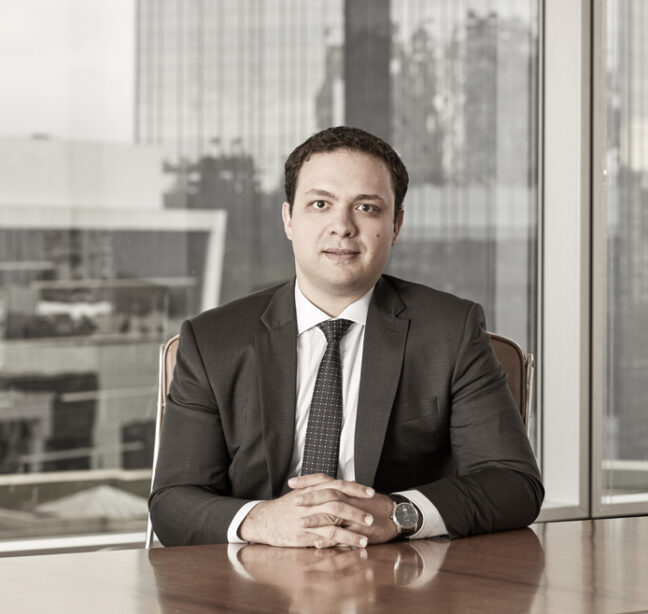TTR DealMaker Q&A with Cescon Barrieu partner Daniel Laudisio

Daniel Laudisio – Cescon Barrieu
Daniel Laudisio is a partner of the Banking and Finance, Capital Markets, Mergers and Acquisitions, Private Equity, Corporate Law and Governance, and ESG & Impact practices of Cescon Barrieu Advogados. He represents banks and other financial institutions, private equity firms, multinationals, private and public companies and other investors in a wide range of transactions including mergers, acquisitions, asset sales, joint ventures, equity and debt offerings and structured finance transactions in several different industries. His ESG & Impact practice involves sustainable finance matters.
He holds a Bachelor of Laws degree (LL.B.) from Pontifícia Universidade Católica de São Paulo (PUC-SP) and Master of Laws degree (LL.M.) from Columbia University School of Law and was an international associate at a major New York law firm.
He is consistently recognized among the most prominent Brazilian lawyers in capital markets and finance by “Chambers and Partners”, “International Financial Law Review – IFLR” and “The Legal 500”.
TTR: How have historically low interest rates impacted the appetite for fixed income products in Brazil over the past 12 months, and what has this meant for your practice?
D. L.: The low interest rates that we recently experienced resulted in a substantial increase in ECM transactions. It also presented liability management opportunities, particular for frequent issuers.
Brazilian retail investors were mostly used to high returns deriving from fixed income investments and reaping the benefits from traditionally high interest rates. They would sit on fixed income assets and enjoy acceptable returns.
A new local environment where lower interest rates began to affect returns forced the hand of retail investors to look for other investment opportunities with higher return rates. At the same time, Brazilian retail investors have increasingly become more familiar with the ideas of financial planning and investment through asset managers and broker dealers, as opposed to traditional investment using large commercial banks with whom they have their checking accounts. The increased number of independent financial planners, broker dealers and asset managers, coupled with the public pension reform that was recently approved also played a hand in it.
TTR: What has buoyed the fixed income market over the past 18 months and how did ECM volatility impact issuances in Brazil?
D. L.: While low interest rates afforded issuers with liability management opportunities and resulted in a very large number of ECM transactions, we also saw the Covid-19 pandemic result in an increase in distressed and high-yield transactions for issuers in industries that were most affected by the Covid-19 pandemic, such as transportation and entertainment.
The ECM market has been extremely volatile, though. Notwithstanding the large number of recent IPOs, an even larger number of potential IPOs failed to price or failed to meet the valuation that issuers and selling shareholders were expecting. A large number of IPOs also priced close to the bottom of the price range, while other issuers experienced a significant share price increase in the first days of trading, perhaps indicating a higher than usual discount by institutional investors that participated in the bookbuilding.
TTR: To what extent have issuances been driven by a pressing need for cash, versus opportunistic financial padding or share buybacks, versus more typical corporate financial management?
D. L.: The extent that a particular issuer has been affected by the Covid-19 pandemic has been a determining factor. Issuers that were mostly affected had to tap capital markets to increase liquidity positions while issuers that either were not materially affected or actually benefited from opportunities created by the pandemic accessed capital markets for liability management and to fund opportunistic acquisitions or other investments.
TTR: How has the focus on ESG translated into practical benefits for issuers that have taken a proactive approach to ESG matters?
D. L.: The focus on ESG and sustainable finance has clearly presented issuers with the opportunity of raising capital at a lower cost. Green bonds attract the interest of funds that can only invest in companies or projects that have been certified as “green”. We have seen transactions on which interest rates could be reduced by as much as 10 basis points to the extent that the issuer obtained a green certification.
TTR: What is your forecast for the fixed income market in Brazil this year, and which sectors will be most represented amongst issuers?
D. L.: On DCM, to the extent that the privatization and divestment program of state-owned companies, of the Federal Government and of certain State Governments continue, a significant number of transactions that are infrastructure-related is expected, given BNDES’ reduced financing role in the past two years. Liability management is also expected to continue.
Healthcare and health-related companies, fintechs and other tech companies tend to continue to be stars of the ECM market given the effects of the Covid-19 pandemic and the changes to consumer behavior deriving therefrom.
